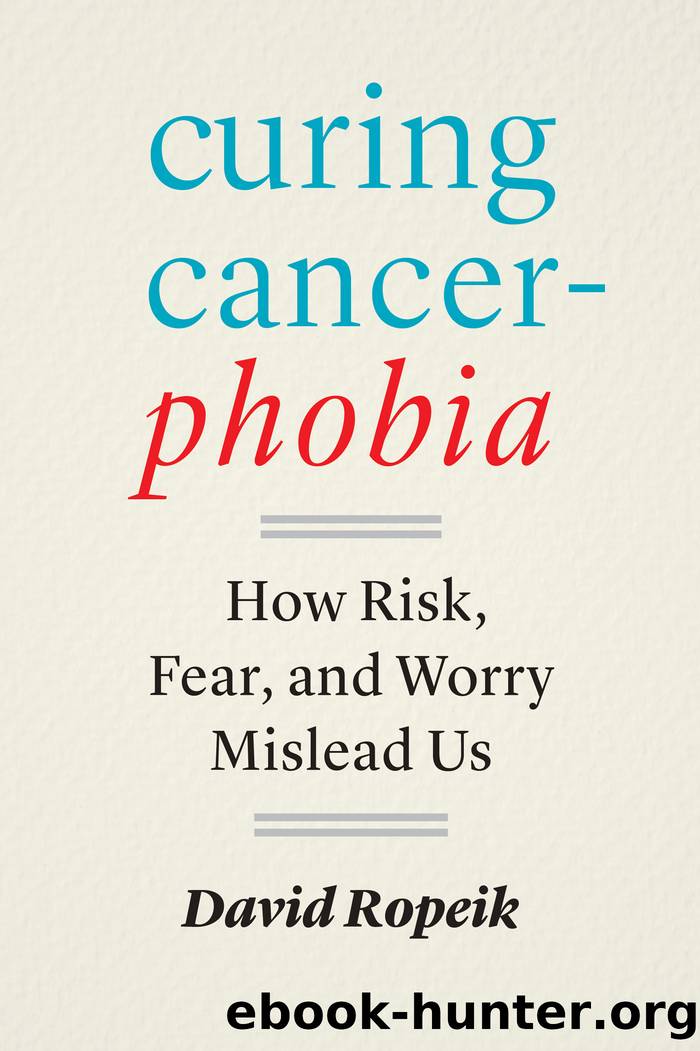Curing Cancerphobia by David Ropeik

Author:David Ropeik
Language: eng
Format: epub
Publisher: Johns Hopkins University Press
Published: 2023-11-15T00:00:00+00:00
Ethnicity, Race, Religion
In addition to those of lower SES, or some like Lara at high risk, people in certain ethnic and cultural groups, and those of deep religious faith, are also less likely to screen for cancer. Here too fatalism seems to play a significant role.
As of 2010, Latino men were less likely to participate in prostate cancer screening, either by PSA or by digital rectal exam (41%), than white men (57%) or African American men (59%), even though prostate cancer was the most commonly diagnosed cancer among Latino men in the United States (131 per 100,000). One reason, researchers report, is the powerful cultural norm among Latino men of manlinessâmachismo. As several subjects in the study told Z. A. Rivera-Ramos and L. P. Buki, they feared finding out that they had prostate cancer because âif I have prostate cancer I will no longer be a man.â One Mexican American man described his fatalism this way: âMachismo is always machismo, right? But if one has a [serious] illness like this one [prostate cancer], holding machista views doesnât help ⦠[In that case] one may as well die because, due to machismo, one will not want to get [medical] care.â25 Finding out that they had prostate cancer would mean facing a frightening choice, between the cultural importance of manliness versus treatment that might save their lives but that would threaten that manliness. So to avoid the sense of powerlessness that such a no-win choice would create, they choose not to screen, not to knowâavoiding that difficult decision altogether. The research is clear about the effect this form of cancer fear has on health. As Rivera-Ramos and Buki reported, âDue, in part, to lower rates of screening ⦠Latinos are almost four times as likely to be diagnosed at an advanced stage than non-Latino Whites.â26
Fatalism also seems to discourage some Latina women from mammography. One study reported: âIn Hispanic women, great fear of cancer is associated with extreme fatalism about the disease. Most believe that cancer cannot be cured, and a diagnosis is considered a death sentence. This fear leads to the avoidance of the subject (and mammography).â27 A literature review found, âMany Hispanic women strongly believe that the fear of finding cancer would deter them from screening,â and noted, âSeveral studies report that many Hispanic women would prefer not to know the diagnosis of breast or cervical cancer.â28 In interviews with American women who had moved from Mexico or from Central or South America, researchers found, âBecause informants believed that breast cancer is fatal, they anticipated that knowledge of a breast cancer diagnosis would render them terribly hopeless.â29 This fear scared some women away from mammography.
Participant 1: âIâd rather not go, that way the doctor canât tell me that I have cancer, because just by knowing, that I will, that I will die, just from knowing ⦠if I go to the doctor tomorrow and he tells me âYou have breast cancer,â I would die.â
Interviewer: âYou would die from knowing or â¦â
Participant 1: âFrom knowing.
Download
This site does not store any files on its server. We only index and link to content provided by other sites. Please contact the content providers to delete copyright contents if any and email us, we'll remove relevant links or contents immediately.
How Data Happened by Unknown(167)
Introduction to Social Work Practice : A Practical Workbook by Herschel Knapp(144)
Global Health Governance and Commercialisation of Public Health in India by Anuj Kapilashrami Rama V. Baru(109)
Curing Cancerphobia by David Ropeik(80)
Feminist Global Health Security by Clare Wenham(79)
Restoring Quality Health Care by Scott W. Atlas(73)
Risk Communication and Infectious Diseases in an Age of Digital Media by Anat Gesser-Edelsburg Yaffa Shir-Raz(67)
The Pandemic Divide by Gwendolyn L. Wright Lucas Hubbard and William A. Darity Jr(66)
Transforming Health Care Scheduling and Access: Getting to Now by Gary Kaplan(65)
Insane Society: A Sociology of Mental Health by Peter Morrall(64)
Oversight and Review of Clinical Gene Transfer Protocols: Assessing the Role of the Recombinant DNA Advisory Committee by Rebecca N. Koehler(64)
Into Africa, Out of Academia by Kwan Kew Lai(61)
Social Work in a Glocalised World by Mona Livholts Lia Bryant(61)
FALSE PANDEMICS: ARGUMENTS AGAINST THE RULE OF FEAR by Wolfgang Wodarg(61)
Pandemic India by Arnold David;(59)
The Metropolitan Academic Medical Center by David E. Rogers Eli Ginzberg(56)
Psychosocial Interventions for Mental and Substance Use Disorders: A Framework for Establishing Evidence-Based Standards by Mary Jane England(54)
World Health Systems by Sun Xiaoming;(48)
A Hospital for Ashe County by Janet C. Pittard(45)
